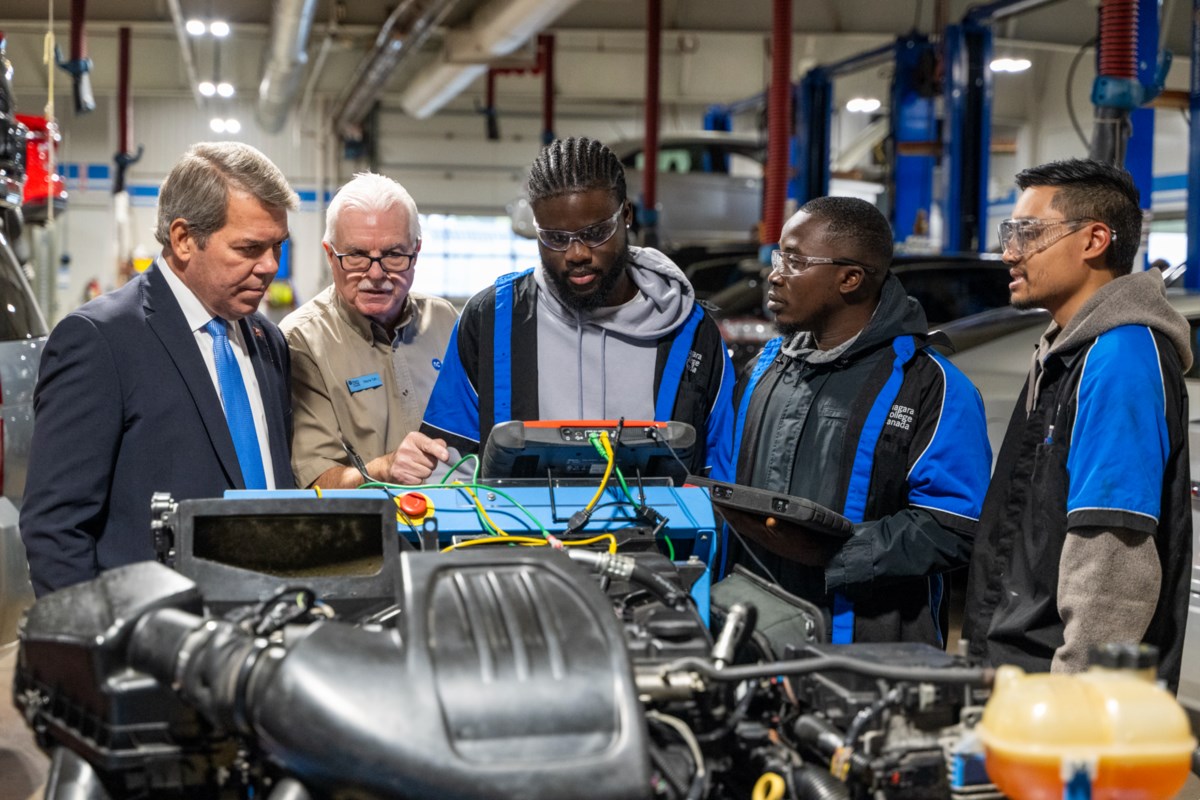
NEWS RELEASE
NIAGARA COLLEGE
*************************
Niagara College’s motive power program is getting a boost thanks to an investment from the federal government.
On Tuesday, Oct. 15, Vance Badawey, Member of Parliament, Niagara Centre, and parliamentary secretary to the minister of transport, announced $365,854 from the federal government – matched by the college – through the 2023 Canadian Apprenticeship Strategy – ‘Investments in Training Equipment’ program stream.
As a leader in green automotive technology, the investment will advance the college’s ability to train students on hybrid and electric vehicle technology. The funding is supporting the acquisition of new vehicles, battery and charging equipment, enabling students to master complex vehicle repair and diagnostics – in-demand skills for careers in the evolving auto industry.
“In my role, I know just how fast the automotive industry is evolving,” said Badawey in NC’s Green Automotive Technology Lab. “To stay not just relevant but ahead of the curve, we need to make smart, forward-looking investments. That’s exactly what this is. A smart investment in young professionals who represent the future of this country. Institutions like Niagara College are where this transformation happens. I am proud that our federal government can play a role in empowering the next generation through funding initiatives like this for the future of green technology.”
“A sincere thank you to the federal government for this funding and for so much support over the years,” said NC President Sean Kennedy. “Our motive power program is a shining example of Niagara College’s trailblazing and industry-responsive academic programming. This investment will help us continue to ensure graduates are prepared for in-demand careers to grow Canada’s green economy.”
The college purchased an electric Chevrolet Silverado, Blazer, BMW I 4, Ford Mustang Mach-E, and a Toyota Mirai Hydrogen fuel cell vehicle. In addition, the college purchased new battery and charging equipment and will invest in new solar charging and hydrogen filling stations in the lab.
“This will allow us to get very involved with high voltage battery rebuilding, testing, and repair,” said Wayne Toth, professor and motive power program coordinator.
Badawey, joined by members of the college leadership team, faculty, staff, and students, had a chance to see a few of the new electric vehicles and high voltage batteries on display. Toth and motive power students demonstrated EV battery safety, and spoke to the rebuilding process of HV batteries.
“This investment will ensure Niagara College continues to be at the forefront of hybrid, electric vehicle and hydrogen training for our students,” said Toth.
As many hybrid and electric vehicles on the road today come out of warranty, repairs that typically went to new car dealers for servicing now provide great opportunities for general repair shops.
“There are huge opportunities in the auto industry, as general repair shops are realizing the service repairs that they are missing out on, and as senior technicians retire,” said Toth. “Our students will graduate with the expertise to put them in high-demand.”
In the Green Automotive Technology Lab – which opened in 2018 thanks to funding from the province – Badawey had the chance to see the college’s progress on an EV truck conversion project. Students and faculty have been working to convert a 1979 Chevy pick-up with gasoline engine into a working electric vehicle – a shining example of NC’s innovative spirit.
The college’s expertise in green automotive training is also sought after by experienced technicians and first responders. The college continues to offer aftermarket training to service technicians at Canadian Tire and NAPA, among others, and EV safety training to first responders (EMS, police and fire).
“We ran some pilots that went over very well, and participants want more,” said Toth.
Learn more about NC’s School of Trades: https://www.niagaracollege.ca/trades/
*************************
